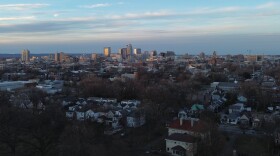Louisville Mayor Greg Fischer is happy with how the city's economy is growing. Unemployment is low, there are plenty of open jobs and schools are working on preparing students for the workforce's needs. That's what he told me in a sit-down interview Thursday at his Metro Hall office.
Looking ahead to 2018, Fischer said he would like to see the economy become more globalized and innovation-based. Median wages in Jefferson County are up more than 9 percent since 2010, according to U.S. Census Bureau data, a rise Fischer attributed to greater focus on evolving the local economy. He pointed to advanced manufacturing and bourbon tourism as examples of growth sectors.
Widespread access to good job training is necessary for setting up Louisville for the future, he said.
"I want to make sure that everybody feels they’re along for the ride in terms of being connected to a skill that gives them a positive and hopeful future," Fischer said.
Programs at Jefferson County Public School and Jefferson Community and Technical College are helping with that, he said.
Fischer said he wants to accelerate efforts that will help fill the 30,000 jobs currently open in Louisville. To do that, he said, will require building on initiatives such as the JCPS talent development academies program, created earlier this year with funding from a $65,000 GE Appliances grant.
"I would like to see us have more progress with career-pathing, from high school all the way to workforce demands," Fischer said. "Fortunately JCPS is doing a real nice job with the talent academy approach, businesses are partnering with JCPS now, as well, to have that type of understanding of what workforces need and what JCPS is producing."
He would like to see more public-private collaboration at other educational institutions as well, such as those that award certificates and two- and four-year degrees.
"When you have unemployment lower than 4 percent and you have 30,000 open jobs in the community, what the message the market is sending to you is our economic development strategy is working," he said. "So we just now need to keep scaling it and grow more talent and bring more talent to the city."
Public Safety
Economic development wasn't the only area in which Fischer saw success this year that he hopes to continue in 2018. I asked him whether there are any goals he failed to achieve in 2017 that he'd like another chance to try for.
"We’ve made progress in all the areas," he said. "We can always do more and we can go faster. We exist to make sure the quality of life for our citizens is improving, certainly I believe that’s taking place and the data supports that."
What does doing more mean to him? Continuing to grow the economy, for one.
Fischer said the city's approach to crime and particularly homicides will continue to depend on collaboration with both citizens and federal law enforcement agencies. Investigations between local and federal officials have already led to arrests.
"I would anticipate there will be more of that next year," Fischer said. "And the message we want to send to the bad guys is: Don't do your business here."
On the public safety front, aggravated assault occurrences are up compared to 2016. And according to data from the Louisville Metro Police Department, there are already more homicides — 120 — in LMPD's jurisdiction than in 2016. That year, there were 117 homicides.
During the interview, Fischer said homicides were down compared to 2016, and a spokesman didn't immediately respond to later requests for clarification about which numbers to which Fischer was referring.
Even so, Fischer said the current levels are unacceptable.
"So the important thing in that category in particular is to say, 'Does the city have a plan? Are our partners strong?'" he said.
Fischer declined to say whether anything in Louisville's crime and homicide reduction strategy would change in 2018.
Other Matters
Will Louisville become a "sanctuary city" next year? Fischer said the term is a political one, and he said he wants Louisville to comply with federal and local laws while being "a great city for refugees and immigrants."
"I think we’ve managed the situation well and we will continue to send a message to the world that our foreign-born population is welcome here," he said. "It makes the city much more interesting, much more entrepreneurial and it’s also contributing to the growth of the city, which we need."
And on the topic of monuments — a fraught one, as national and local discussions of honoring Confederate personalities raged this year — Fischer said he doesn't have any ideas on who would be a good subject for a sculpture. He recently announced more details in the plan for reviewing Louisville's public art and monuments, and grant funding for local artists.
"There’s not necessarily enough monuments of women and people of color in our community, and that’s the same thing for all over America," he said. "When you look around, it’s primarily older white guys like me, so it’s time to spread the wealth a little bit."
This post has been updated to reflect the city's homicide count.






